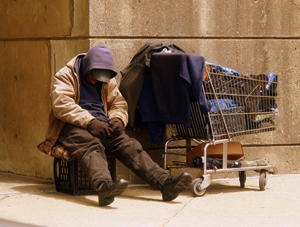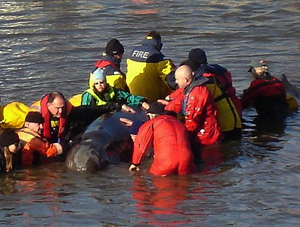Environment is all of America and its problems . . . It is a hungry child in a land of affluence. It is housing that is not worthy of the name.
— U.S. Senator Gaylord Nelson, founder of Earth Day, April 22, 1970.[col grid=”2-1″]

Homeless veteran, Boston, MA. By Matthew Woitunski [CC-BY-3.0], via Wikimedia Commons

Beached whale comforted by 10 rescuers. Via Wikimedia Commons
“Annie”* resides on an upscale, mid-town Manhattan street. By day. At night, she rides the subway. Sleep is difficult, sometimes impossible. But she likes it better than the crowded New York City shelter where her safety, privacy and belongings were under constant threat. She says subway cars are cleaner and there aren’t bugs. Scabies is an especially maddening affliction when you live in your clothes.
Camped at her regular station on one of New York’s most prestigious corners, Annie looks to the largesse of fellow New Yorkers for her survival. She is smart and engaging, petite with an innate loveliness. Her observations on life are wry and unique. Passers-by stop to talk or give her money. Occasionally, one takes her to lunch, for which she is grateful to tears.
She relies on the handouts. And Medicaid, sometimes. She has a golf ball-size tumor on the right side of her face, for which she receives chemotherapy. She cannot afford the related medication to protect her blood count; infection is a recurring danger. She is missing one front tooth and losing the other. A recent battle with an abscess cost her six more teeth. She dreams of new ones; without teeth, landing a job is nigh impossible.
She has a partner, “Jimmy.”* He has an occasional temp job moving furniture but his legs need medical attention. Annie and Jimmy lean against each other to stay upright on the subway. You are not allowed to lie down on the benches. One night, his identification was stolen while they slept, which created a world of problems. Without even an address it is difficult to prove who you are. If she collects enough money they sometimes rent a cheap room for a night, to catch up on sleep and hygiene.
Last October, Annie tried to qualify for disability. The government shut down.
Nothing about Annie’s past is relevant to how she will create a new future, least of all pundits blaming her for her circumstance. She wants to break out of the cycle in which she spins, believes she will, and requires help to do so.
Annie’s story is one of millions — millions of members of our species suffering, some dying, because of conditions in their habitat.
It is time for American environmentalism to join the fight against American poverty and homelessness.
The United States Department of Housing and Urban Development estimates that at any given time more than 600,000 fellow Americans are homeless. Advocates put the annual number at more than 3 million. 1.6 million are children. More than 100,000 are veterans.
46.5 million Americans live in poverty. 16 million of them are children.
49 million Americans reside in “food insecure” households.
Displaced, starved and resource deprived species are a central concern of environmentalism. The human is one of those species.
When we environmentalists educate about climate change, we warn of the devastating consequences that will be visited upon our homes and health in the decades ahead. But poverty and homelessness are already everywhere around us. And have been for decades.
When we speak of sustainability, we speak of a green future where humans live in harmony with nature. But for millions nature is the enemy. Seven homeless men have died in the San Francisco Bay area since November 28 because of a cold snap that dropped temperatures to between 30 and 45 degrees.
Preventable threats to our own species should be a top priority of environmentalists, no matter the cause. In the speech quoted above, delivered on the first Earth Day, Senator Nelson told the Denver crowd that environmentalism has to be about “human dignity,” as well as about nature. (EarthDesk, December 12, June 27, April 22 )
Protection of the rights, welfare and dignity of people, such as Annie and Jimmy, was once a core principle of modern American environmentalism. It should be again.
«« »»
Click the links below for more information:













